Adams J.T. Empire on the Seven Seas. The British Empire 1784-1939
Подождите немного. Документ загружается.

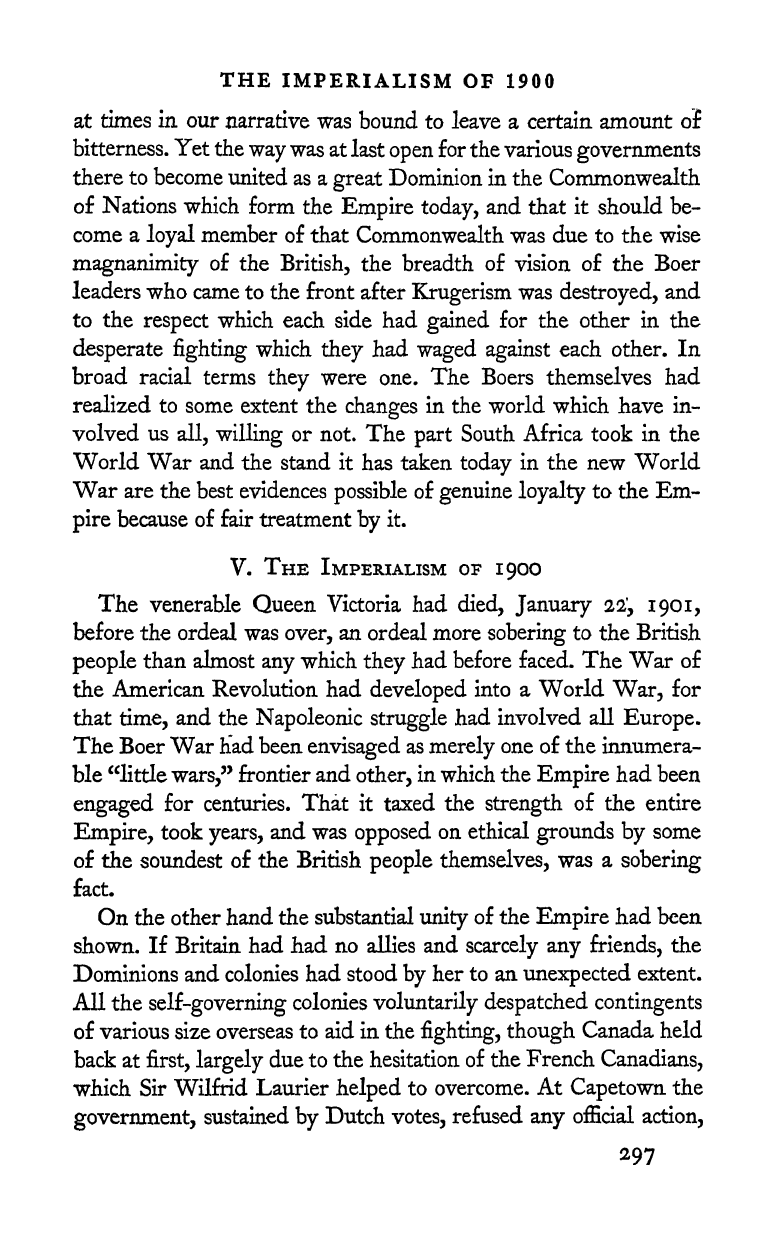
THE
IMPERIALISM OF 1900
at
times
in
our
narrative
was
bound to
leave a
certain
amount
of
bitterness.
Yet
the
way
was
at
last
open
for the
various
governments
there
to
become
united as a
great
Dominion
in
the
Commonwealth
of
Nations
which
form
the
Empire
today,
and
that
it
should
be-
come
a
loyal
member
of
that
Commonwealth was
due
to the
wise
magnanimity
of
the
British,
the
breadth
of
vision
of
the
Boer
leaders
who came
to the front
after
Krugerism
was
destroyed,
and
to
the
respect
which each
side
had
gained
for
the
other in
the
desperate
fighting
which
they
had
waged against
each other.
In
broad racial terms
they
were
one.
The Boers
themselves
had
realized
to
some
extent
the
changes
in
the world which have
in-
volved
us
all,
willing
or
not.
The
part
South
Africa
took
in
the
World War and
the
stand
it
has
taken
today
in the
new
World
War
are
the best
evidences
possible
of
genuine
loyalty
to
the
Em-
pire
because of
fair
treatment
by
it.
V.
THE
IMPERIALISM
OF
1900
The venerable
Queen
Victoria had
died,
January
22', 1901,
before the ordeal was
over,
an
ordeal more
sobering
to
the
British
people
than
almost
any
which
they
had
before
faced.
The
War
of
the
American
Revolution
had
developed
into a
World
War,
for
that
time,
and
the
Napoleonic
struggle
had
involved
all
Europe.
The
Boer
War
had
been
envisaged
as
merely
one of the
innumera-
ble
"little
wars,"
frontier
and
other,
in
which
the
Empire
had been
engaged
for centuries.
That
it
taxed
the
strength
of
the
entire
Empire,
took
years,
and
was
opposed
on ethical
grounds
by
some
of the
soundest
of the British
people
themselves,
was
a
sobering
fact.
On the other hand
the substantial
unity
of
the
Empire
had been
shown.
If Britain had had
no allies and
scarcely
any
friends,
the
Dominions
and colonies
had stood
by
her
to
an
unexpected
extent.
All
the
self-governing
colonies
voluntarily despatched contingents
of
various
size
overseas
to
aid
in the
fighting,
though
Canada
held
back
at
first,
largely
due
to
the hesitation of
the
French
Canadians,
which
Sir
Wilfrid
Laurier
helped
to overcome. At
Capetown
the
government,
sustained
by
Dutch
votes,
refused
any
official
action,
297
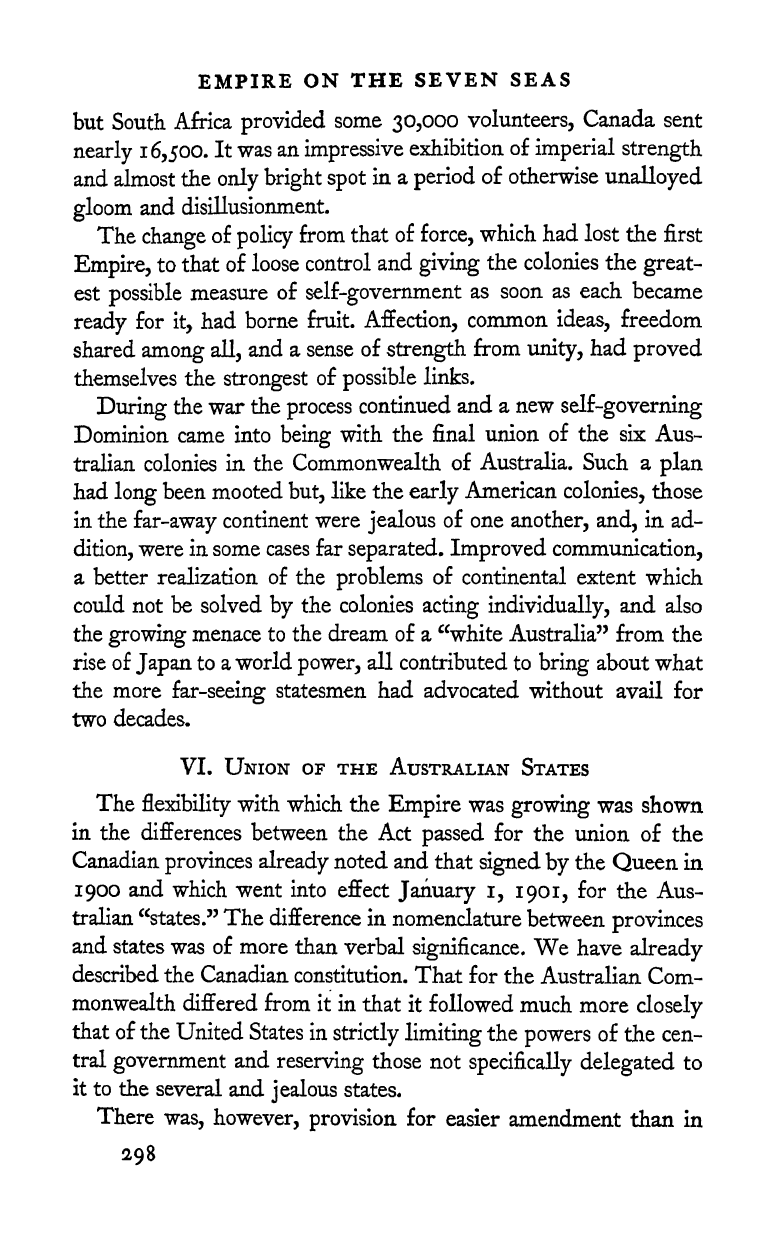
EMPIRE
ON
THE
SEVEN
SEAS
but South
Africa
provided
some
30,000
volunteers,
Canada
sent
nearly
16,500.
It
was
an
impressive
exhibition
of
imperial
strength
and almost
the
only bright
spot
in
a
period
of otherwise
unalloyed
gloom
and
disillusionment.
The
change
of
policy
from
that
of
force,
which had lost
the
first
Empire,
to
that of
loose control
and
giving
the
colonies
the
great-
est
possible
measure
of
self-government
as
soon
as
each
became
ready
for
it,
had
borne
fruit.
Affection,
common
ideas,
freedom
shared
among
all,
and
a sense
of
strength
from
unity,
had
proved
themselves
the
strongest
of
possible
links.
During
the
war
the
process
continued
and a
new
self-governing
Dominion
came into
being
with
the
final
union
of the
six
Aus-
tralian colonies
in the
Commonwealth
of Australia. Such a
plan
had
long
been mooted
but,
like the
early
American
colonies,
those
in the
far-away
continent
were
jealous
of one
another,
and,
in
ad-
dition,
were in
some
cases
far
separated. Improved
communication,
a
better realization
of
the
problems
of
continental
extent
which
could
not
be
solved
by
the
colonies
acting
individually,
and
also
the
growing
menace
to
the dream
of
a
"white
Australia" from
the
rise
of
Japan
to
a
world
power,
all
contributed
to
bring
about what
the more
far-seeing
statesmen
had
advocated
without
avail
for
two
decades.
VI. UNION
OF
THE
AUSTRALIAN
STATES
The
flexibility
with which the
Empire
was
growing
was
shown
in
the
differences
between the
Act
passed
for
the
union
of the
Canadian
provinces already
noted and
that
signed by
the
Queen
in
1900
and
which went
into effect
January
i,
1901,
for
the
Aus-
tralian
"states."
The
difference in
nomenclature
between
provinces
and states
was of
more
than
verbal
significance.
We
have
already
described the
Canadian
constitution.
That for
the
Australian
Com-
monwealth differed from
it in
that
it
followed
much
more
closely
that of the
United
States
in
strictly
limiting
the
powers
of
the
cen-
tral
government
and
reserving
those
not
specifically delegated
to
it to
the
several
and
jealous
states.
There
was, however,
provision
for
easier
amendment than
in
298
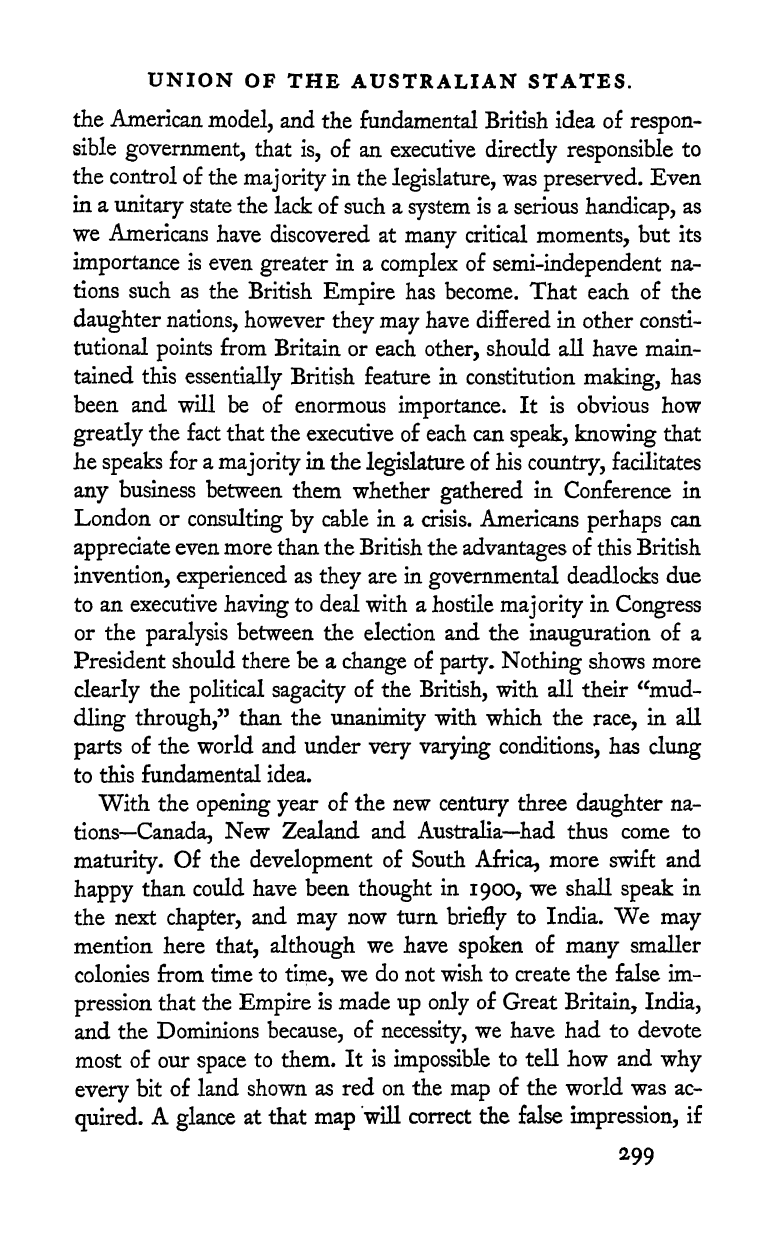
UNION
OF
THE
AUSTRALIAN STATES.
the
American
model,
and
the
fundamental British
idea
of
respon-
sible
government,
that
is,
of
an
executive
directly responsible
to
the control
of
the
majority
in
the
legislature,
was
preserved.
Even
in
a
unitary
state
the
lack
of such
a
system
is
a
serious
handicap,
as
we
Americans
have
discovered
at
many
critical
moments,
but
its
importance
is
even
greater
in a
complex
of
semi-independent
na-
tions such
as
the British
Empire
has become. That
each
of the
daughter
nations,
however
they
may
have
differed in
other
consti-
tutional
points
from
Britain or
each
other,
should
all
have main-
tained
this
essentially
British feature
in
constitution
making,
has
been
and
will be of
enormous
importance.
It
is
obvious
how
greatly
the fact
that the
executive
of
each
can
speak, knowing
that
he
speaks
for
a
majority
in
the
legislature
of
his
country,
facilitates
any
business between
them whether
gathered
in
Conference
in
London
or
consulting
by
cable in
a crisis. Americans
perhaps
can
appreciate
even
more than the
British the
advantages
of
this
British
invention,
experienced
as
they
are
in
governmental
deadlocks
due
to
an
executive
having
to
deal
with
a
hostile
majority
in
Congress
or the
paralysis
between the
election
and
the
inauguration
of a
President
should there
be a
change
of
party.
Nothing
shows
more
clearly
the
political
sagacity
of the
British,
with all their "mud-
dling through,"
than the
unanimity
with
which
the
race,
in all
parts
of the world
and
under
very
varying
conditions,
has
clung
to
this
fundamental
idea.
With
the
opening
year
of
the
new
century
three
daughter
na-
tionsCanada,
New
Zealand
and Australia had
thus
come to
maturity.
Of
the
development
of
South
Africa,
more
swift
and
happy
than could
have been
thought
in
1900,
we
shall
speak
in
the next
chapter,
and
may
now turn
briefly
to
India.
We
may
mention
here
that,
although
we
have
spoken
of
many
smaller
colonies
from time to
time,
we
do
not wish to create
the
false im-
pression
that
the
Empire
is made
up
only
of
Great
Britain,
India,
and
the
Dominions
because,
of
necessity,
we
have had
to
devote
most of our
space
to them.
It is
impossible
to tell how and
why
every
bit
of land
shown
as
red
on
the
map
of the
world
was
ac-
quired.
A
glance
at that
map
will
correct the false
impression,
if
299
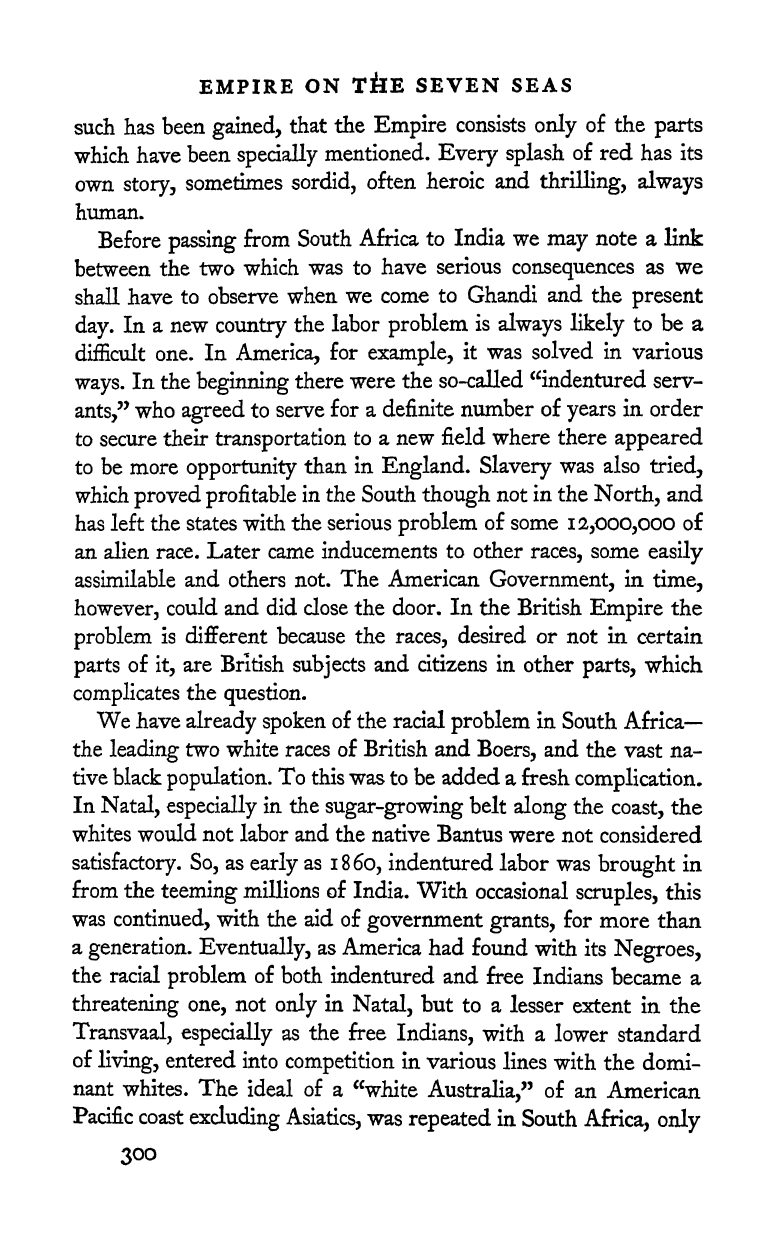
EMPIRE
ON T&E
SEVEN
SEAS
such
has
been
gained,
that
the
Empire
consists
only
of
the
parts
which have
been
specially
mentioned.
Every
splash
of
red has
its
own
story,
sometimes
sordid,
often
heroic
and
thrilling, always
human.
Before
passing
from
South
Africa
to
India
we
may
note
a link
between
the
two which
was to
have
serious
consequences
as
we
shall have
to
observe
when
we
come
to Ghandi
and
the
present
day.
In
a
new
country
the
labor
problem
is
always likely
to be a
difficult
one.
In
America,
for
example,
it was solved
in
various
ways.
In
the
beginning
there
were
the
so-called
"indentured
serv-
ants/*
who
agreed
to
serve
for
a definite
number
of
years
in
order
to
secure
their
transportation
to a new
field where
there
appeared
to be
more
opportunity
than in
England.
Slavery
was
also
tried,
which
proved
profitable
in the South
though
not
in the
North,
and
has left the
states
with
the
serious
problem
of
some
12,000,000
of
an alien
race.
Later
came
inducements to
other
races,
some
easily
assimilable
and others not.
The American
Government,
in
time,
however,
could
and
did
close
the
door. In
the British
Empire
the
problem
is
different because
the
races,
desired
or
not
in
certain
parts
of
it,
are British
subjects
and
citizens
in
other
parts,
which
complicates
the
question.
We
have
already
spoken
of the racial
problem
in
South
Africa
the
leading
two
white
races of
British
and
Boers,
and
the
vast
na-
tive
black
population.
To
this
was
to
be
added
a
fresh
complication,
In
Natal,
especially
in
the
sugar-growing
belt
along
the
coast,
the
whites would not labor and
the
native
Bantus
were
not
considered
satisfactory.
So,
as
early
as
1860,
indentured
labor
was
brought
in
from the
teeming
millions of
India.
With
occasional
scruples,
this
was
continued,
with the
aid of
government
grants,
for
more than
a
generation.
Eventually,
as
America had
found
with its
Negroes,
the racial
problem
of
both
indentured
and
free
Indians became
a
threatening
one,
not
only
in
Natal,
but
to a
lesser
extent
in
the
Transvaal,
especially
as
the free
Indians,
with a
lower standard
of
living,
entered
into
competition
in
various lines
with
the
domi-
nant
whites.
The ideal
of
a
"white
Australia,"
of
an
American
Pacific
coast
excluding
Asiatics,
was
repeated
in
South
Africa,
only
300
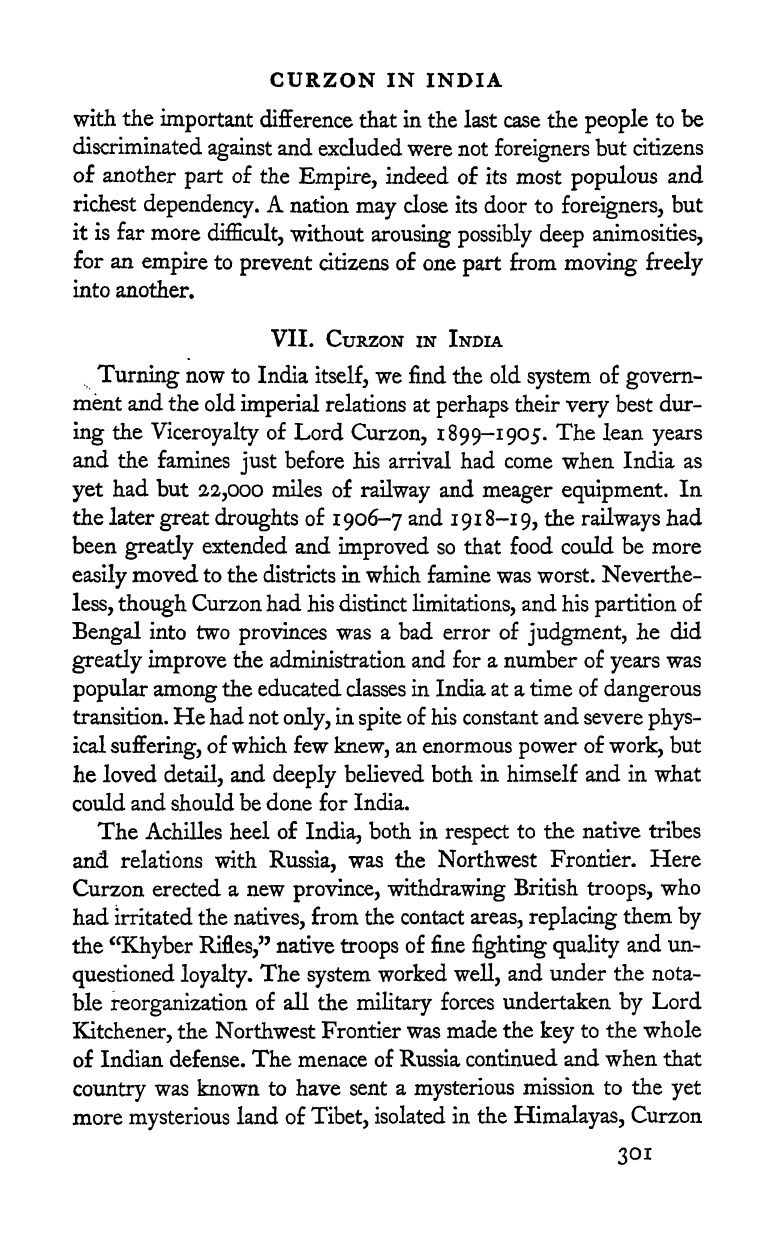
CURZON
IN INDIA
with
the
important
difference
that
in
the last case
the
people
to
be
discriminated
against
and
excluded
were
not
foreigners
but
citizens
of
another
part
of
the
Empire,
indeed of
its
most
populous
and
richest
dependency.
A
nation
may
close
its
door
to
f
oreigners,
but
it is far
more
difficult,
without
arousing possibly deep
animosities,
for an
empire
to
prevent
citizens
of
one
part
from
moving
freely
into
another.
VII. CURZON
IN
INDIA
x
Turning
now to
India
itself,
we
find
the
old
system
of
govern-
ment
and
the
old
imperial
relations
at
perhaps
their
very
best
dur-
ing
the
Viceroyalty
of
Lord
Curzon, 1899-1905.
The lean
years
and
the
famines
just
before his arrival
had come
when
India as
yet
had
but
22,000
miles
of
railway
and
meager
equipment.
In
the
later
great droughts
of
1906-7
and
1918-19,
the
railways
had
been
greatly
extended
and
improved
so that food could
be more
easily
moved
to the
districts in which famine
was
worst.
Neverthe-
less,
though
Curzon
had
his
distinct
limitations,
and his
partition
of
Bengal
into
two
provinces
was a bad
error of
judgment,
he
did
greatly
improve
the administration and
for
a
number of
years
was
popular
among
the educated classes in
India
at
a time
of
dangerous
transition. He had not
only,
in
spite
of
his
constant
and severe
phys-
ical
suffering,
of
which
few
knew,
an
enormous
power
of
work,
but
he
loved
detail,
and
deeply
believed both
in himself and
in
what
could
and
should
be
done
for
India.
The
Achilles
heel of
India,
both
in
respect
to the
native tribes
and relations
with
Russia,
was the
Northwest
Frontier.
Here
Curzon erected
a new
province,
withdrawing
British
troops,
who
had
irritated
the
natives,
from
the
contact
areas,
replacing
them
by
the
"Khyber
Rifles,
5
'
native
troops
of
fine
fighting
quality
and
un-
questioned
loyalty.
The
system
worked
well,
and
under
the nota-
ble
reorganization
of
all
the
military
forces
undertaken
by
Lord
Kitchener,
the Northwest
Frontier was
made
the
key
to
the
whole
of
Indian defense.
The
menace
of Russia
continued
and when that
country
was
known
to have
sent
a
mysterious
mission to
the
yet
more
mysterious
land of
Tibet,
isolated
in the
Himalayas,
Curzon
301
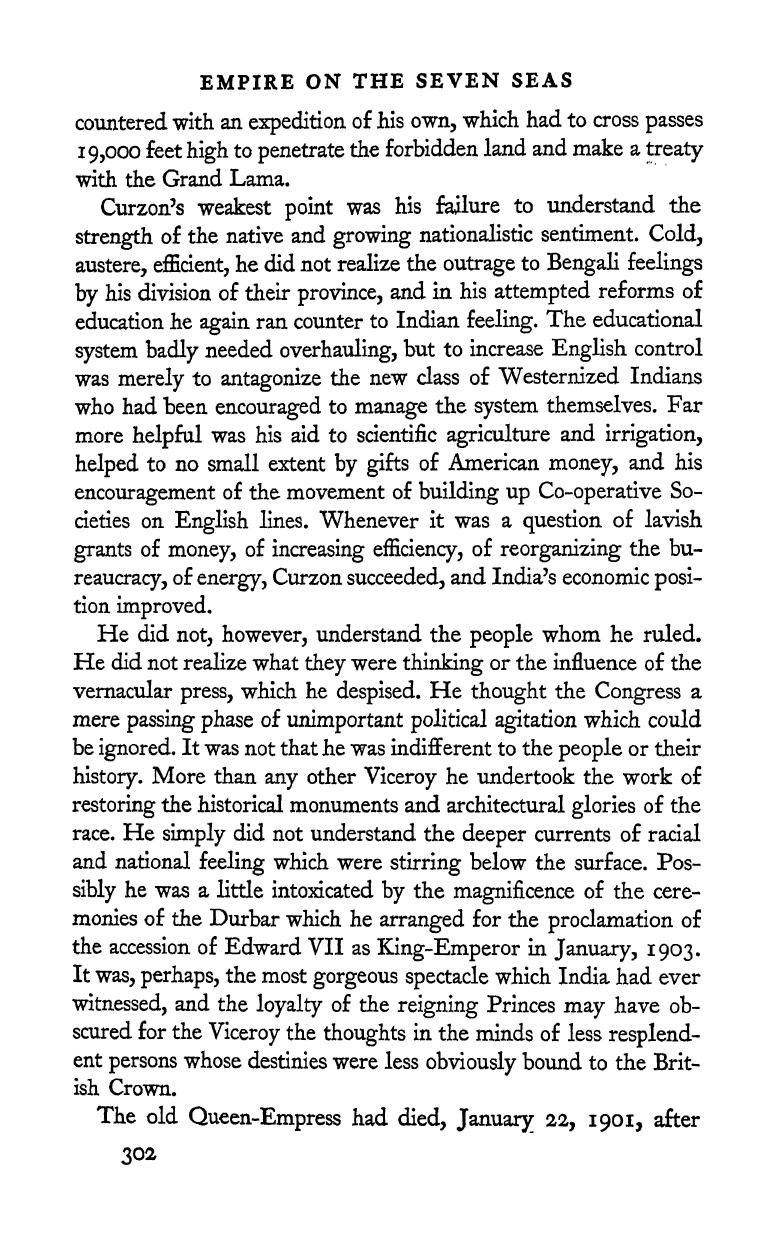
EMPIRE
ON
THE
SEVEN
SEAS
countered with
an
expedition
of his
own,
which had
to cross
passes
19,000
feet
high
to
penetrate
the
forbidden
land
and make
a
treaty
with
the
Grand
Lama.
Curzon's weakest
point
was
his
failure
to
understand
the
strength
of
the
native and
growing
nationalistic
sentiment.
Cold,
austere,
efficient,
he
did
not
realize
the
outrage
to
Bengali
feelings
by
his
division of
their
province,
and
in
his
attempted
reforms
of
education
he
again
ran counter
to
Indian
feeling.
The
educational
system badly
needed
overhauling,
but
to
increase
English
control
was
merely
to
antagonize
the
new class
of
Westernized Indians
who
had
been
encouraged
to
manage
the
system
themselves.
Far
more
helpful
was
his
aid
to
scientific
agriculture
and
irrigation,
helped
to
no
small extent
by
gifts
of
American
money,
and his
encouragement
of
the
movement
of
building
up Co-operative
So-
cieties on
English
lines. Whenever
it
was
a
question
of
lavish
grants
of
money,
of
increasing
efficiency,
of
reorganizing
the
bu-
reaucracy,
of
energy,
Curzon
succeeded,
and India's
economic
posi-
tion
improved.
He did
not,
however,
understand
the
people
whom
he ruled.
He did
not realize
what
they
were
thinking
or
the
influence
of
the
vernacular
press,
which
he
despised.
He
thought
the
Congress
a
mere
passing
phase
of
unimportant
political
agitation
which
could
be
ignored.
It
was
not
that
he
was
indifferent
to the
people
or
their
history.
More than
any
other
Viceroy
he undertook the
work of
restoring
the
historical
monuments and
architectural
glories
of
the
race. He
simply
did not
understand the
deeper
currents of racial
and national
feeling
which
were
stirring
below the
surface. Pos-
sibly
he
was
a
little intoxicated
by
the
magnificence
of
the cere-
monies
of
the
Durbar
which he
arranged
for the
proclamation
of
the accession
of
Edward VII as
King-Emperor
in
January,
1903.
It
was,
perhaps,
the most
gorgeous
spectacle
which
India
had
ever
witnessed,
and
the
loyalty
of
the
reigning
Princes
may
have
ob-
scured
for the
Viceroy
the
thoughts
in
the
minds of less
resplend-
ent
persons
whose
destinies were less
obviously
bound
to
the
Brit-
ish
Crown.
The
old
Queen-Empress
had
died,
January
22,
1901,
after
302
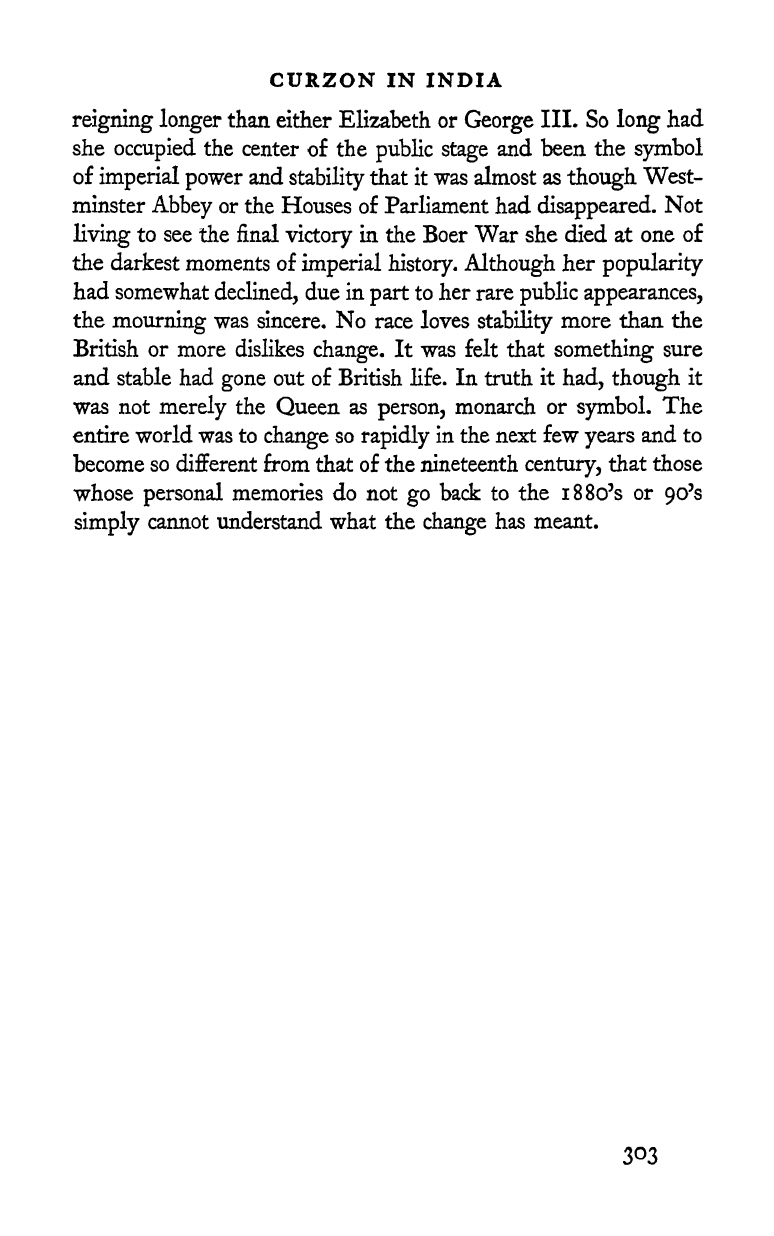
CURZON
IN INDIA
reigning
longer
than
either Elizabeth
or
George
III.
So
long
had
she
occupied
the
center
of the
public stage
and been
the
symbol
of
imperial power
and
stability
that
it
was almost as
though
West-
minster
Abbey
or
the Houses of Parliament
had
disappeared.
Not
living
to
see
the
final
victory
in
the
Boer War she
died at one
of
the
darkest
moments
of
imperial
history. Although
her
popularity
had
somewhat
declined,
due
in
part
to
her
rare
public appearances,
the
mourning
was sincere.
No
race
loves
stability
more than the
British or more
dislikes
change.
It
was felt
that
something
sure
and
stable had
gone
out
of British life.
In
truth
it
had,
though
it
was not
merely
the
Queen
as
person,
monarch
or
symbol.
The
entire
world
was to
change
so
rapidly
in the next
few
years
and
to
become
so
different
from
that of the nineteenth
century,
that
those
whose
personal
memories do
not
go
back to
the i88o's
or
9o's
simply
cannot
understand
what the
change
has
meant.
303
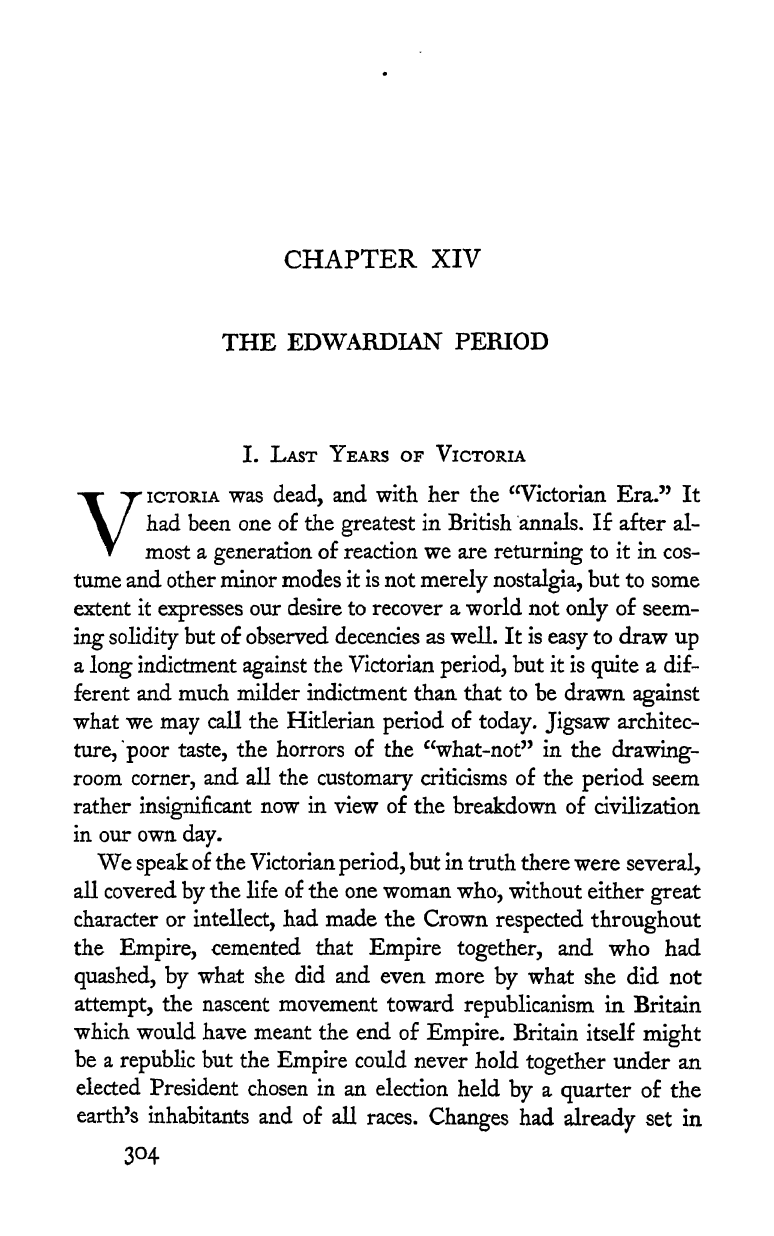
CHAPTER
XIV
THE
EDWARDIAN
PERIOD
I. LAST
YEARS OF VICTORIA
VICTORIA
was
dead,
and with
her the
'^Victorian Era."
It
had been
one
of the
greatest
in British
annals. If
after
al-
most
a
generation
of reaction
we
are
returning
to
it in
cos-
tume and
other
minor modes it
is
not
merely
nostalgia,
but
to
some
extent
it
expresses
our desire
to recover
a
world
not
only
of
seem-
ing
solidity
but
of
observed decencies
as well. It is
easy
to
draw
up
a
long
indictment
against
the
Victorian
period,
but
it is
quite
a dif-
ferent
and
much
milder
indictment
than
that to
be drawn
against
what we
may
call the Hitlerian
period
of
today.
Jigsaw
architec-
ture,
'poor
taste,
the
horrors
of the "what-not" in
the
drawing-
room
corner,
and
all
the
customary
criticisms of
the
period
seem
rather
insignificant
now
in
view
of
the
breakdown
of civilization
in
our
own
day.
We
speak
of
the Victorian
period,
but
in
truth
there
were
several,
all
covered
by
the
life
of
the
one woman
who,
without
either
great
character
or
intellect,
had made the Crown
respected
throughout
the
Empire,
cemented
that
Empire
together,
and
who
had
quashed,
by
what she
did
and
even
more
by
what she
did
not
attempt,
the
nascent
movement
toward
republicanism
in
Britain
which
would
have
meant
the end
of
Empire.
Britain
itself
might
be a
republic
but
the
Empire
could
never hold
together
under
an
elected
President chosen in
an
election
held
by
a
quarter
of the
earth's
inhabitants
and
of
all
races.
Changes
had
already
set
in
34
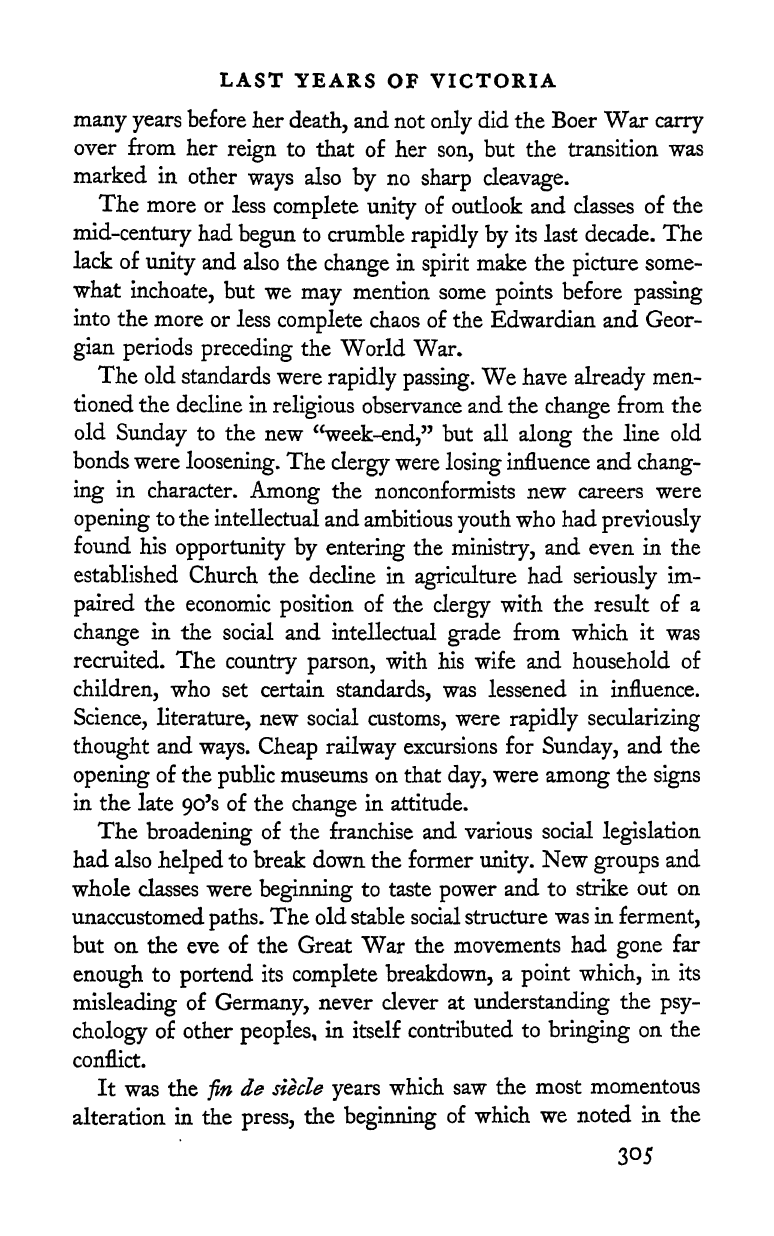
LAST
YEARS
OF
VICTORIA
many
years
before
her
death,
and not
only
did
the
Boer War
carry
over from
her
reign
to
that
of
her
son,
but
the
transition
was
marked
in
other
ways
also
by
no
sharp
cleavage.
The
more
or
less
complete
unity
of
outlook
and
classes
of
the
mid-century
had
begun
to
crumble
rapidly
by
its
last
decade.
The
lack
of
unity
and
also the
change
in
spirit
make the
picture
some-
what
inchoate,
but
we
may
mention
some
points
before
passing
into
the
more
or
less
complete
chaos of
the Edwardian
and
Geor-
gian
periods
preceding
the
World War*
The old
standards
were
rapidly
passing.
We
have
already
men-
tioned the
decline
in
religious
observance
and
the
change
from the
old
Sunday
to the
new
"week-end,"
but
all
along
the line
old
bonds
were
loosening.
The
clergy
were
losing
influence
and
chang-
ing
in
character.
Among
the
nonconformists
new careers
were
opening
to
the intellectual
and
ambitious
youth
who
had
previously
found
his
opportunity
by
entering
the
ministry,
and
even
in
the
established
Church
the
decline
in
agriculture
had
seriously
im-
paired
the
economic
position
of
the
clergy
with
the
result
of a
change
in
the
social and
intellectual
grade
from
which
it
was
recruited.
The
country
parson,
with his
wife
and
household
of
children,
who
set certain
standards,
was
lessened
in
influence.
Science,
literature,
new
social
customs,
were
rapidly secularizing
thought
and
ways.
Cheap railway
excursions
for
Sunday,
and
the
opening
of the
public
museums
on that
day,
were
among
the
signs
in
the
late
go's
of the
change
in
attitude.
The
broadening
of
the
franchise and
various
social
legislation
had
also
helped
to break
down
the former
unity.
New
groups
and
whole
classes were
beginning
to taste
power
and to
strike
out
on
unaccustomed
paths.
The
old
stable
social structure
was in
ferment,
but on
the eve of the
Great
War
the movements
had
gone
far
enough
to
portend
its
complete
breakdown,
a
point
which,
in
its
misleading
of
Germany,
never
clever
at
understanding
the
psy-
chology
of
other
peoples,
in
itself
contributed to
bringing
on
the
conflict.
It
was
the
fin
de
stecle
years
which
saw
the
most momentous
alteration
in
the
press,
the
beginning
of
which
we
noted
in the
305
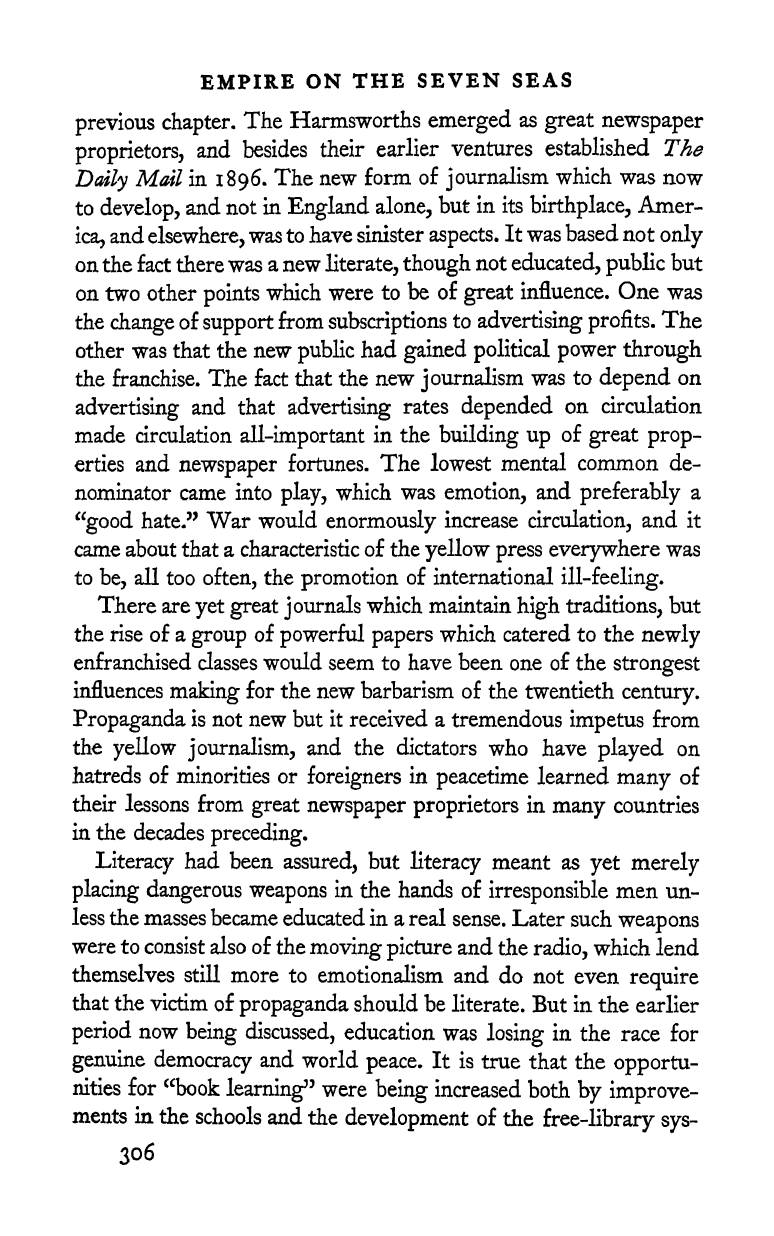
EMPIRE
ON
THE
SEVEN SEAS
previous
chapter.
The Harmsworths
emerged
as
great newspaper
proprietors,
and besides
their earlier
ventures
established The
Daily
Mail
in
1896.
The new
form
of
journalism
which was
now
to
develop,
and not
in
England
alone,
but
in
its
birthplace,
Amer-
ica,
and
elsewhere,
was to
have
sinister
aspects.
It was
based
not
only
on
the
fact
there
was
a
new
literate,
though
not
educated,
public
but
on
two other
points
which were
to
be of
great
influence. One
was
the
change
of
support
from
subscriptions
to
advertising profits.
The
other
was
that the
new
public
had
gained
political
power
through
the franchise.
The
fact
that the
new
journalism
was
to
depend
on
advertising
and that
advertising
rates
depended
on circulation
made circulation
all-important
in
the
building
up
of
great
prop-
erties and
newspaper
fortunes.
The
lowest
mental
common de-
nominator
came
into
play,
which
was
emotion,
and
preferably
a
"good
hate."
War
would
enormously
increase
circulation,
and it
came
about
that a
characteristic
of the
yellow
press
everywhere
was
to
be,
all
too
often,
the
promotion
of international
ill-feeling.
There are
yet
great
journals
which
maintain
high
traditions,
but
the rise of
a
group
of
powerful papers
which
catered
to
the
newly
enfranchised
classes
would
seem to have
been
one of the
strongest
influences
making
for the
new
barbarism of
the
twentieth
century.
Propaganda
is
not
new
but
it received a
tremendous
impetus
from
the
yellow
journalism,
and the dictators
who
have
played
on
hatreds
of minorities or
foreigners
in
peacetime
learned
many
of
their
lessons from
great
newspaper
proprietors
in
many
countries
in
the
decades
preceding.
Literacy
had
been
assured,
but
literacy
meant
as
yet
merely
placing dangerous
weapons
in
the
hands of
irresponsible
men
un-
less
the
masses became
educated in
a
real
sense. Later
such
weapons
were
to
consist also
of
the
moving
picture
and
the
radio,
which lend
themselves still
more
to
emotionalism
and
do not
even
require
that the
victim
of
propaganda
should
be
literate.
But
in
the
earlier
period
now
being
discussed,
education
was
losing
in
the
race for
genuine
democracy
and
world
peace.
It
is
true
that
the
opportu-
nities
for
"book
learning"
were
being
increased
both
by
improve-
ments
in
the
schools
and the
development
of
the
free-library
sys-
306
